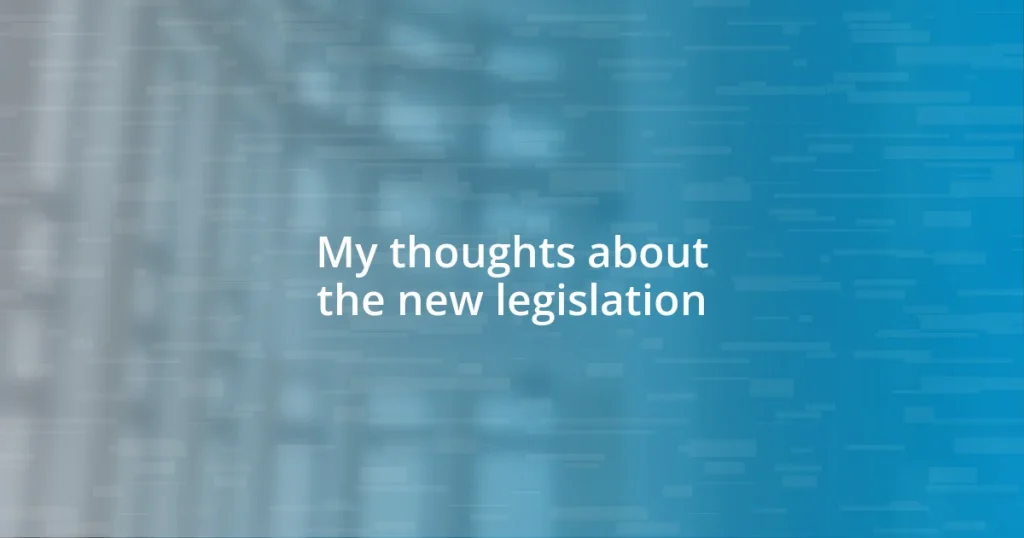Key takeaways:
- New legislation on data privacy introduces stricter protections and increased consumer rights, empowering individuals in managing their personal information.
- While small businesses face compliance challenges, the legislation fosters accountability and encourages consumer engagement regarding their rights.
- Public reaction ranges from cautious optimism to concern over potential economic impacts, highlighting the need for businesses to adapt and innovate in response to regulatory changes.
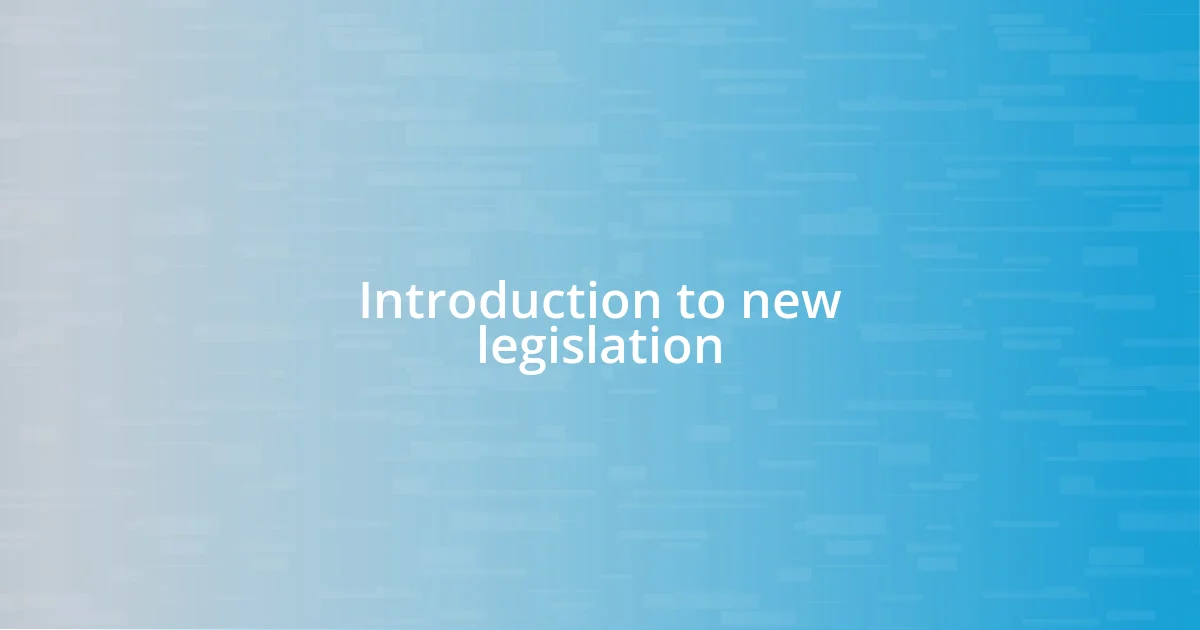
Introduction to new legislation
Legislation often serves as a reflection of society’s evolving needs and values, and the new laws on the table are no exception. I’ve found that each piece of legislation can evoke a range of emotions, from hope to skepticism. I can’t help but wonder, what do these changes mean for everyday folks like you and me?
When I first heard about this new legislation, I felt a buzz of excitement mixed with curiosity. It’s easy to feel overwhelmed by legal jargon, but at its core, this legislation seeks to address pressing issues that impact our daily lives. How often do we pause to consider how a new law can shape our communities?
In my experience, engagement with new legislation can be a powerful tool for empowerment. It’s about understanding the motivations behind these changes and recognizing how they can create pathways for positive impact—or present challenges we must navigate. Have you ever thought about how a single law could influence your neighborhood? It’s these small ripples that can lead to significant transformations in society.
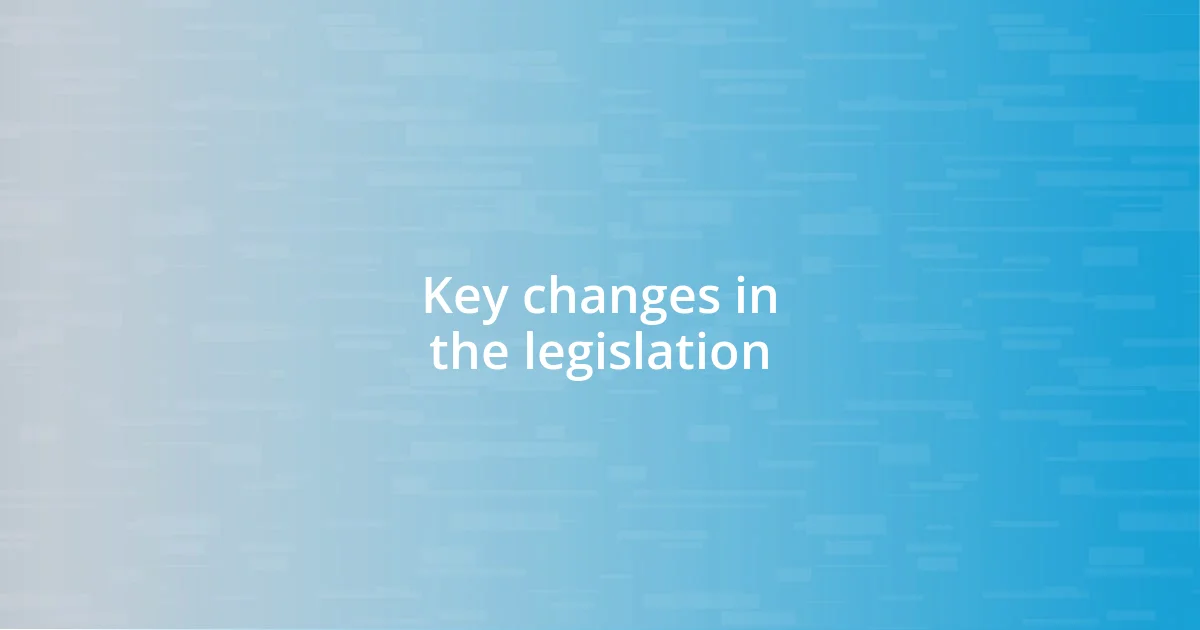
Key changes in the legislation
When diving into the key changes in the legislation, I think it’s crucial to highlight how they directly impact our daily experiences. For example, the new regulations around data privacy aim to give individuals more control over their personal information. Just the other day, I found myself reflecting on the countless times I hesitated to share my data online, and these changes could provide the reassurance many of us desperately need.
Here are some of the pivotal shifts to be aware of:
- Stricter Data Protection: Organizations must now be more transparent about how they collect and use data, giving consumers the right to opt out.
- Increased Penalties for Non-Compliance: Businesses could face severe fines if they fail to protect personal information adequately, which underscores the seriousness of this issue.
- Enhanced Consumer Rights: Individuals will have more straightforward means for requesting their data and understanding their rights, thereby empowering them in a digital world.
This is not just about rules and regulations to me; it’s about building a culture where privacy is respected and valued.
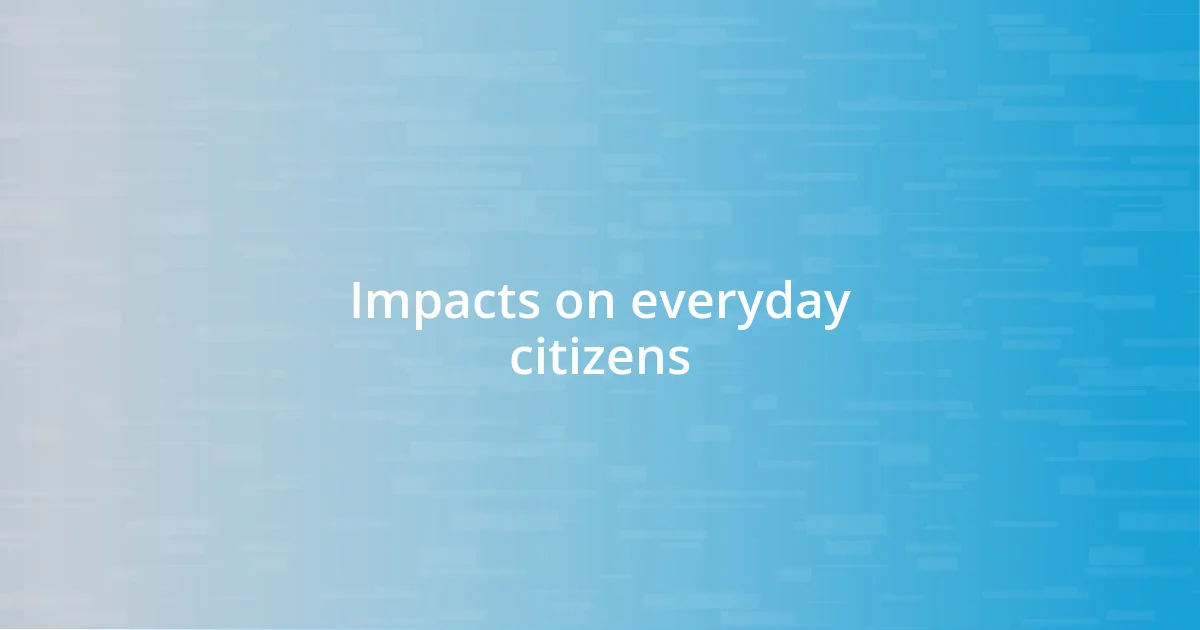
Impacts on everyday citizens
The new legislation will undoubtedly touch the daily lives of ordinary citizens. For instance, I recently spoke with a friend who runs a small local business. She expressed her concerns about the increased compliance demands related to data protection. It’s not only a burden on her workload but also raises questions about how to balance transparency with competitiveness. Do you sometimes feel that small businesses are being squeezed out by regulations meant for larger corporations? I’ve often reflected on how the smaller players are the backbone of our economy and deserve support, not additional hurdles.
Further, I’m intrigued by how this legislation fosters a culture of accountability. A few weeks ago, I experienced an odd yet enlightening incident. I received an email from a company asking for my consent before using my data for marketing. I had always felt this was an area where we had little power. However, seeing this change unfold in real-time brought a sense of hope—a feeling that perhaps our voices are finally being heard. How empowering is it to take control back from the corporations that often operate in the shadows? These shifts are small, yet they signify a more substantial change in our everyday interactions with technology and businesses.
Lastly, I can’t help but think about how this legislation will open dialogues between consumers and companies. Just yesterday, I overheard a group discussing the rights that come with these new rules. It struck me how essential conversations are becoming—people are genuinely interested in understanding their rights! This means we’ll be better equipped to stand up for ourselves as consumers. Have you thought about the last time you felt you could assert your rights in a marketplace? I find it thrilling to imagine a future where we actively seek out information and demand greater respect for our interests.
| Impact on Citizens | Examples |
|---|---|
| Increased Burden on Small Businesses | Smaller businesses may struggle with compliance requirements, potentially impacting their operations. |
| Empowerment through Consent | Consumers will have more control over their data, creating a sense of agency. |
| Engagement and Awareness | Increased discussions among citizens about their rights, fostering community engagement. |
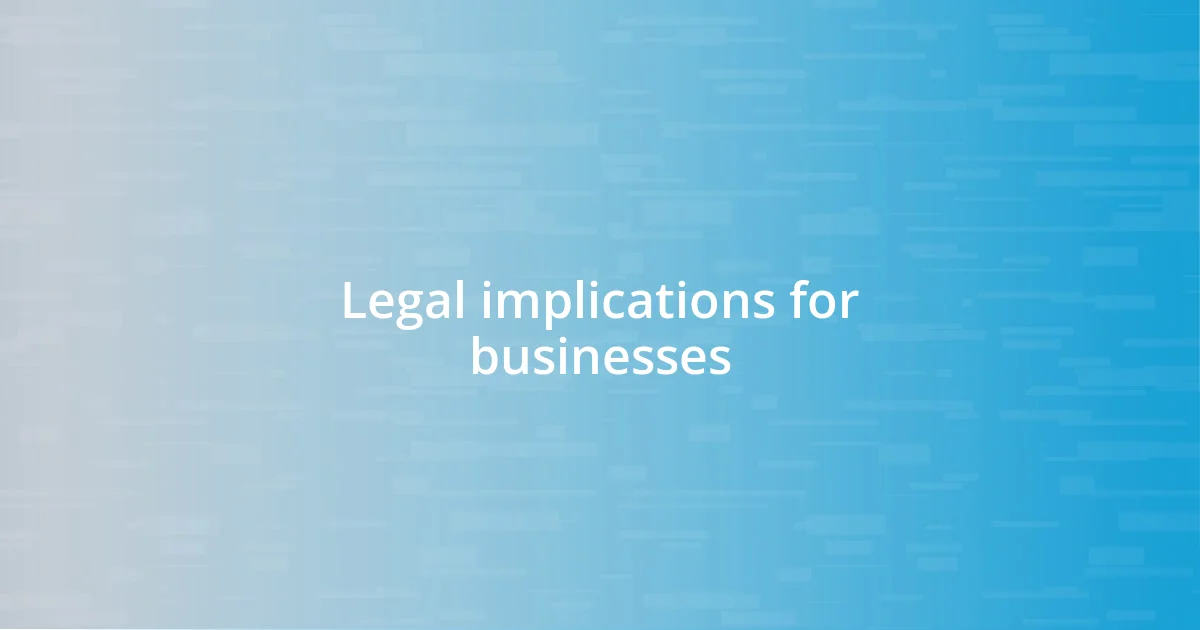
Legal implications for businesses
The new legislation has profound legal implications for businesses, particularly regarding data compliance. From my experience, smaller enterprises often feel overwhelmed by shifting regulations. Just last week, I was chatting with a startup founder who shared how the increasing responsibilities around data protection are making her second-guess whether to invest in growth or focus solely on compliance. Can you imagine being in her shoes, feeling torn between opportunity and obligation?
Furthermore, enhanced penalties for non-compliance are also a cause for concern. I’ve seen companies face fines that can be crippling, especially for those already operating on thin margins. It raises the question: how can businesses still thrive while navigating such stringent regulations? I believe it requires not just adherence to the law, but a fundamental shift in how they engage with their customers—building trust becomes imperative.
Lastly, the mandate for transparency isn’t just about avoiding penalties; it’s an opportunity for businesses to elevate their brand. I recall a conversation with a marketing director who expressed excitement about embracing transparency. He viewed it not just as an obligation, but as a chance to build deeper connections with consumers. It made me wonder, how can businesses leverage these changes to not only comply but to stand out in a crowded market? This kind of forward-thinking could redefine the competitive landscape.
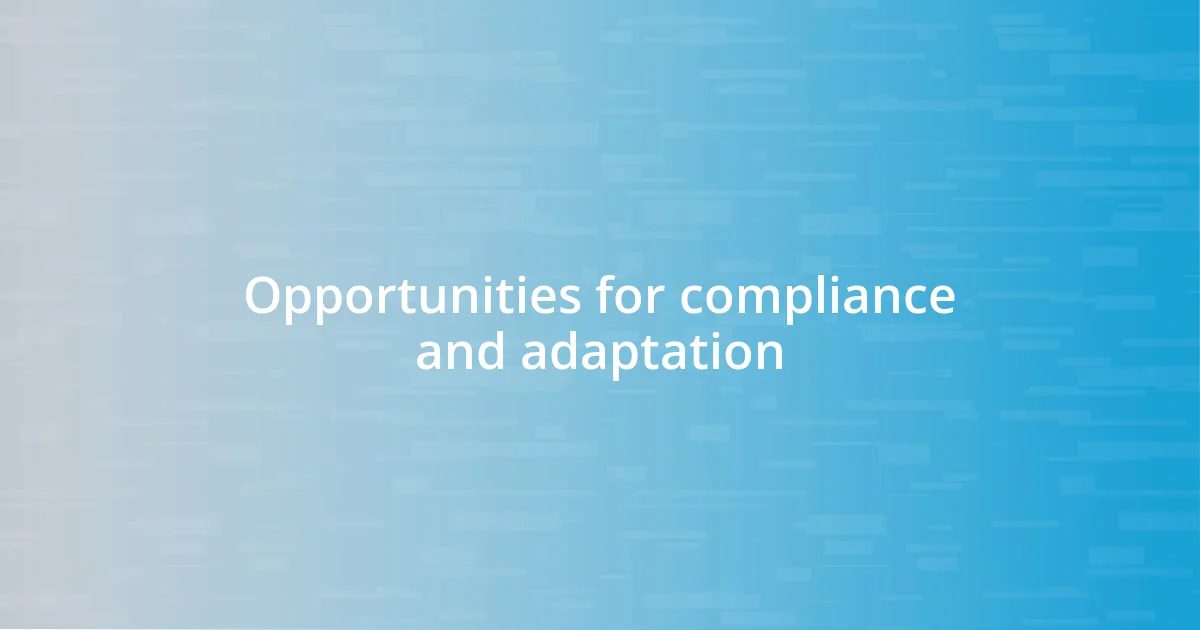
Opportunities for compliance and adaptation
Navigating the new legislation presents an array of exciting opportunities for businesses willing to adapt. I recently attended a workshop where a legal expert emphasized that compliance isn’t merely a box to check; it’s a doorway to innovation. This perspective resonated with me—what if businesses could use compliance as a springboard to enhance their operations? By viewing regulations as opportunities, companies can develop better systems that ultimately improve customer experience.
Another area that piqued my interest is the potential for collaborative solutions. I remember sitting in on a panel discussion with representatives from various industries discussing how they’ve tackled compliance challenges. Hearing how they share strategies inspired me to think about the power of community among businesses. Have you ever considered how pooling resources could ease the burden of compliance? It’s fascinating to imagine networks of businesses coming together, exchanging ideas, and finding creative ways to meet legislative requirements while supporting each other in the process.
I also think about how this legislation can drive businesses to prioritize customer relationships differently. Reflecting on my own experiences, I’ve often turned to brands that show a commitment to ethical practices. When companies embrace transparency, it fosters trust, and trust is vital in getting ahead—who doesn’t want to feel valued as a consumer? Could this shift not only help businesses thrive but also create lasting connections with their customers in an increasingly digital world? It’s a thrilling prospect, one full of potential as we move forward.
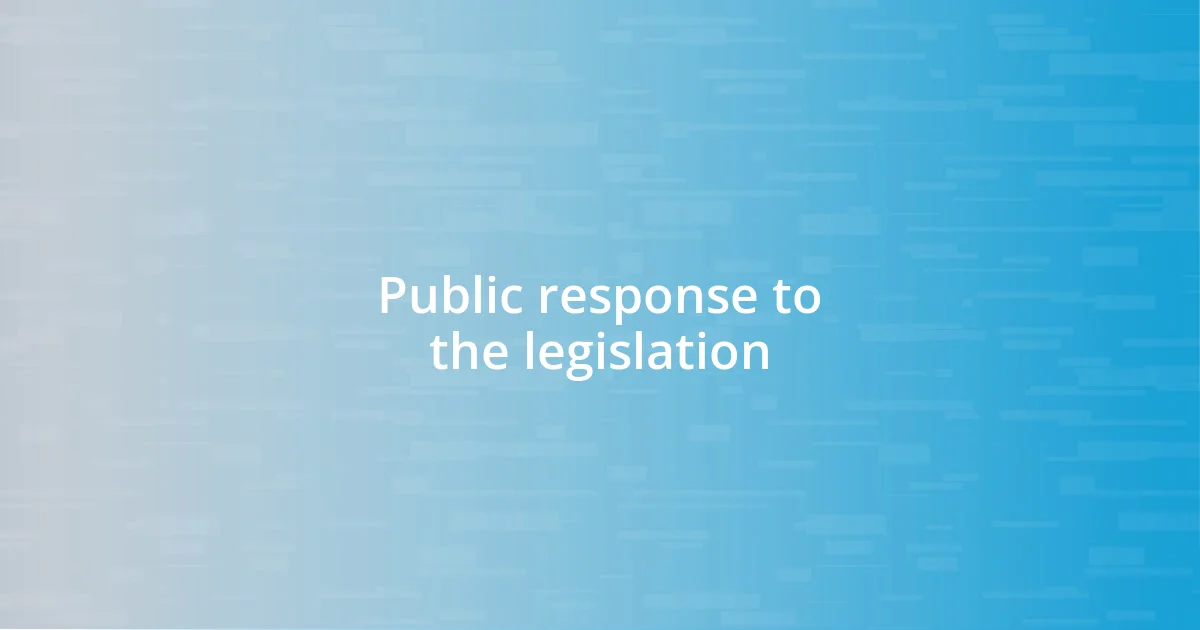
Public response to the legislation
Public reaction to the new legislation has been a mix of cautious optimism and apprehension. I noticed at a recent community meeting that many citizens are eager to see changes that could lead to better accountability from businesses. However, it was equally clear that people felt anxiety over how these adjustments might impact their day-to-day lives—could we potentially see prices rise as companies try to offset compliance costs?
Social media has also buzzed with opinions, and I’ve found that platforms are aflame with discussions about the legislation’s implications. A friend of mine, an avid Twitter user, shared a post that encapsulated the sentiment of many: “New rules sound great until they affect my wallet!” It really made me pause—how often do we celebrate regulations without considering the real-world consequences?
Interestingly, I’ve had conversations with local activists who see this legislation as a pivotal moment for community voices to be heard. One activist passionately explained that increased transparency could lead to more informed citizenry and better business practices in their town. It’s that excitement for change that makes me think—will we see a shift not just in compliance, but in how businesses engage with the public? The road ahead may have bumps, but the potential for positive change is genuinely invigorating.

Future expectations and developments
As I look toward the future of this legislation, I can’t help but feel a sense of anticipation. I remember when a similar law was enacted, and it sparked an innovation wave in my industry. Businesses reimagined their processes, often resulting in unexpected products and services. What if we see a repeat of that momentum? Adapting to this legislation might not just mean compliance; it could lead to groundbreaking advancements that we can’t even envision yet.
I also think about the role technology will play as businesses work to accommodate the new rules. Reflecting on my own experiences with tech integration, I recall how my favorite local café used a simple app update to streamline its operations, ultimately improving customer satisfaction. With this new legislation, could we witness more businesses embracing similar innovations to not only comply but also elevate user experience? The intersection of compliance and technology is bound to lead to exciting developments that could redefine how we interact with brands.
Moreover, I’m curious about how this legislation could influence the educational landscape surrounding business practices. I’ve had conversations with educators who are eager to incorporate compliance topics into business curricula. Imagine students entering the workforce equipped with a strong understanding of regulatory environments. This shift could fundamentally alter how future generations view business practices. Is it too much to hope that we might cultivate a new wave of leaders who embody a commitment to ethical standards from the get-go? The future holds promise, and I’m genuinely excited to see how these developments unfold.











